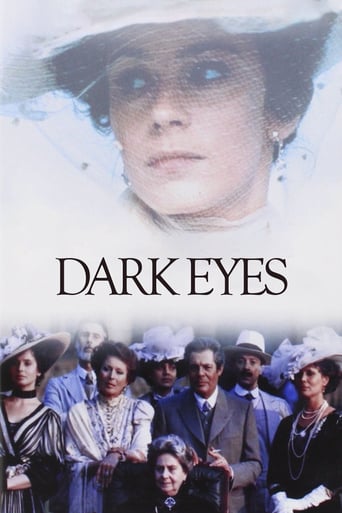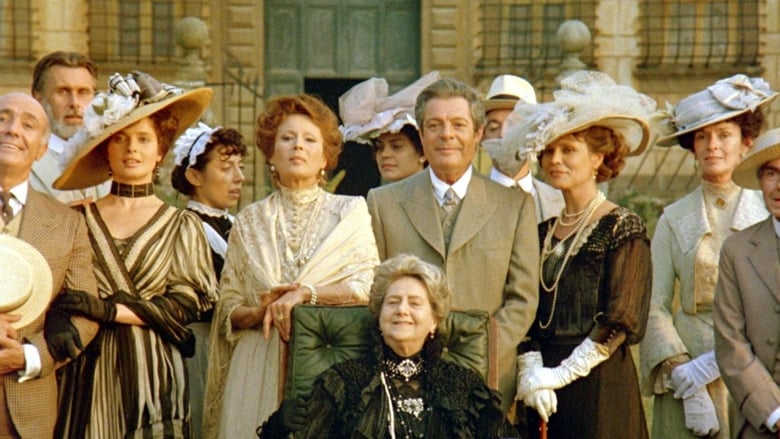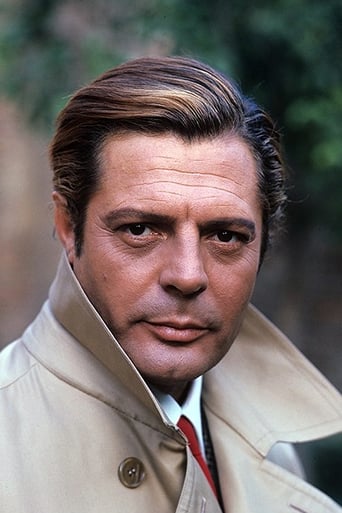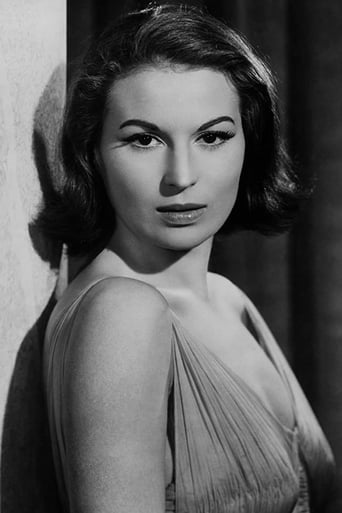Dark Eyes (1987)

Aboard a ship early in the 20th-century, a middle-aged Italian tells his story of love to a Russian.
Watch Trailer
Cast


Reviews
Best movie ever!
If the ambition is to provide two hours of instantly forgettable, popcorn-munching escapism, it succeeds.
It is neither dumb nor smart enough to be fun, and spends way too much time with its boring human characters.
The movie is made so realistic it has a lot of that WoW feeling at the right moments and never tooo over the top. the suspense is done so well and the emotion is felt. Very well put together with the music and all.
This Russian-Italian co-production from 1987 finds two older men, one Italian, the other Russian, talking in the empty dining hall of a slow ocean liner. The Italian tells his story in flashback, as we see him fight with his rich wife, which sends him to a health spa to recuperate, where he meets a bored, young and beautiful Russian woman who is herself unhappily married. After many overtures toward a romance, the Russian wife flees back home, and the Italian follows her, ostensibly on business, but truly in hopes of sparking the romance further.The film is gorgeously photographed, and much attention is paid to costume and set design, as well as delicate color schemes. Marcello Mastroianni received his final of three Best Actor Oscar nominations for this, and he's wonderful as usual. Silvano Mangano plays his wife, and Marthe Keller appears as a family friend. I wasn't familiar with the Russian leads, Elena Safonova and Vsevolod Larionov, but they are fine as well. The story drags a bit in places, and lengthy passages of Russian without subtitles started to detract after a while (I'm not sure if this was the fault of the print I watched, or if it was intentional, to show the language barrier faced by Mastroianni's character).
There's no really much you can say and analyze about this movie. It's not a movie by itself, it's a piece of art lost in the ocean of mundane cinema of the 20-th century. It's like the great literature, the great paintings of history, impregnated with a mystical and hard to define quality in it's texture. For me this is not simply a "movie", i say it again. Like Nostalghia or Andrei Rubliov of Tarkovsky , here the poetics transcends what we usually call cinema, or a film, because it gets a life on it's own, and becomes independent to critical observation. It's like a tiger in the Siberian forest, that you have to simply admire. A tiger is beautiful because it's a tiger, Oci Ciornie it's beautiful because it is Oci Ciornie. Something divine happened to Mihalkov and to the cast when thy made this piece of art. It was the greatest shame and scandal when the jury at Cannes awarded "Sous le Ciel de Satan" the Palme D'or, but who cares...Time is for the art what is for the wine. The good one gets better, the cheap one gets sour and becomes vinegar.
Based (loosely) on Chekhov's story "The Lady With The Little Dog," Oci Ciornie (Dark Eyes) features some of the most sumptuous photography of recent years. Set in Yalta, a sultry Black Sea spa for stylish Russian idlers, Dark eyes features a memorable tragic-comic performance by Marcello Mastroianni as Romano, foolish, gallant, ultimately trivial, and a superbly innocent, deeply moving performance by Yelena Safonova as the woman whom he utterly, shamefully fails. Mikhalkov's script departs from the Chekhov story in ways that some Chiekhov-loving viewers might balk at. But Chekhov's ending is perhaps too subtle and introspective for cinematic realization, and Mikhalkov's alternative, seems justified, if only as a vehicle for Matroianni's extraordinary performance.
Whether this movie is based on, inspired by or just bears a passing resemblance to Chekhov's The Lady With The Little Dog is ultimately academic because what really matters is the movie as it stands, is it good, bad or ho-hum. It's actually rather good if anybody asks you. Sure, there are things that verge on hat of the very oldest kind, like the O'Henryish ending but the film transcends stuff like that easily. It begins with our old friend the Frame narrator buttonholing a passenger on a small cruise ship and laying his life-story on him. The information ladled out by the passenger - despite advancing years he is newly married; he had loved and pursued his wife for years; she in turn was unhappily married and could never love him but finally consented to marry him - over the length of the film is done so cunningly that only the professional film/story analyst will even sense a connection between this and the story told by Marcello Mastroianni, architect manque, married to Miss Gotrocks in the shape of Silvana Mangana, who is seized without warning by a passion for a Russian woman encountered by chance, so much so that he pursues her to her homeland and perseveres in the face of a burocray not unlike that encountered by Melvyn Douglas in HIS attempt to be reunited with Ninotchka, until he is finally able to travel to her small home town. The style is a hybrid of Chekhovian spareness and Visconti opulence but even this seems appropriate for a film determined to charm and seduce the discriminating viewer. Does it succeed? What do you think.






